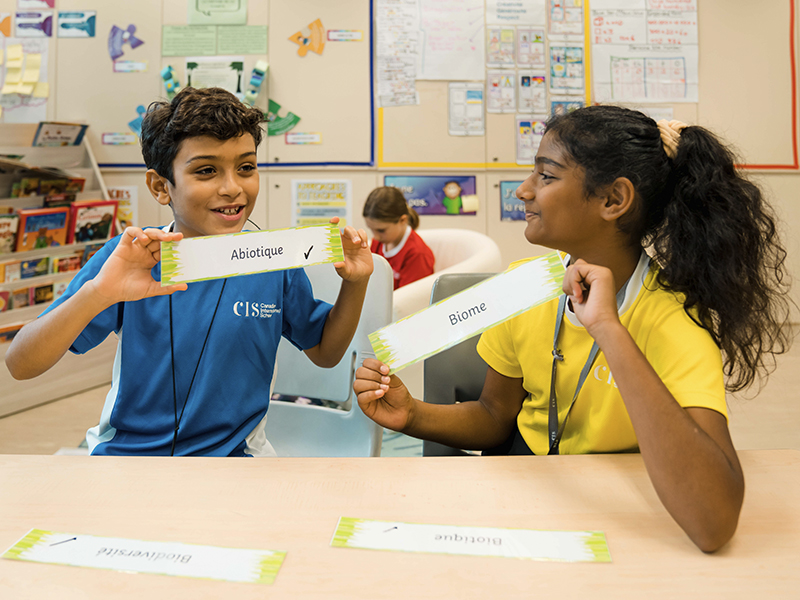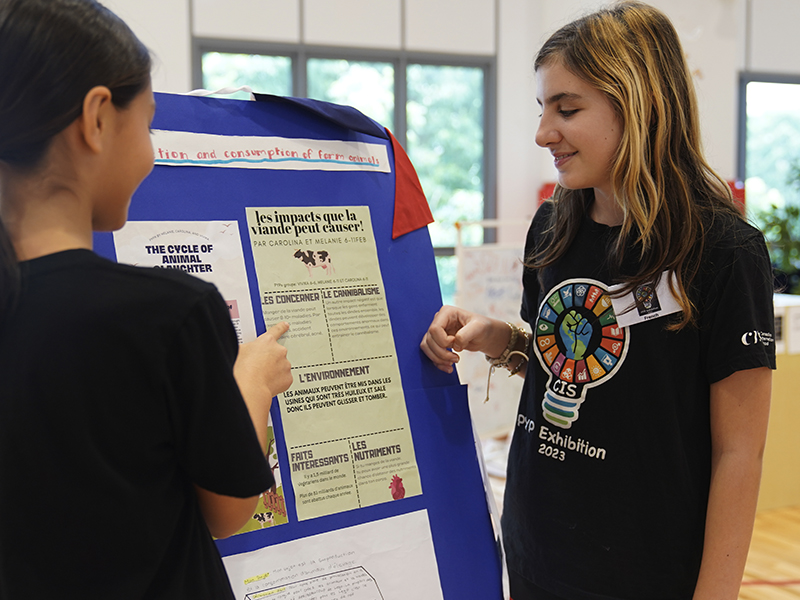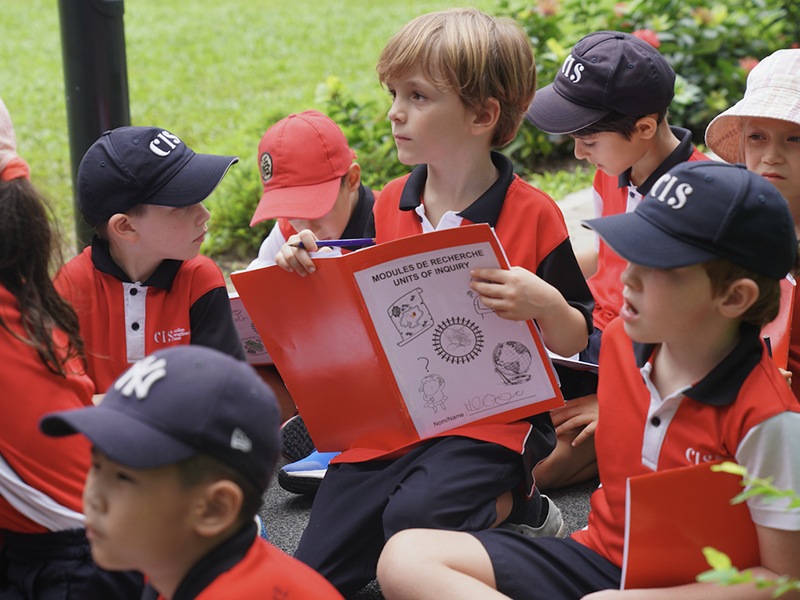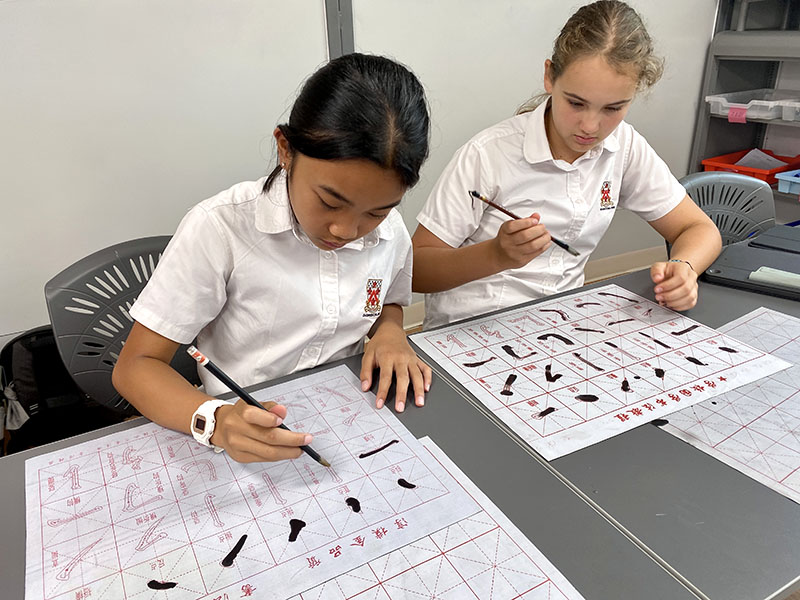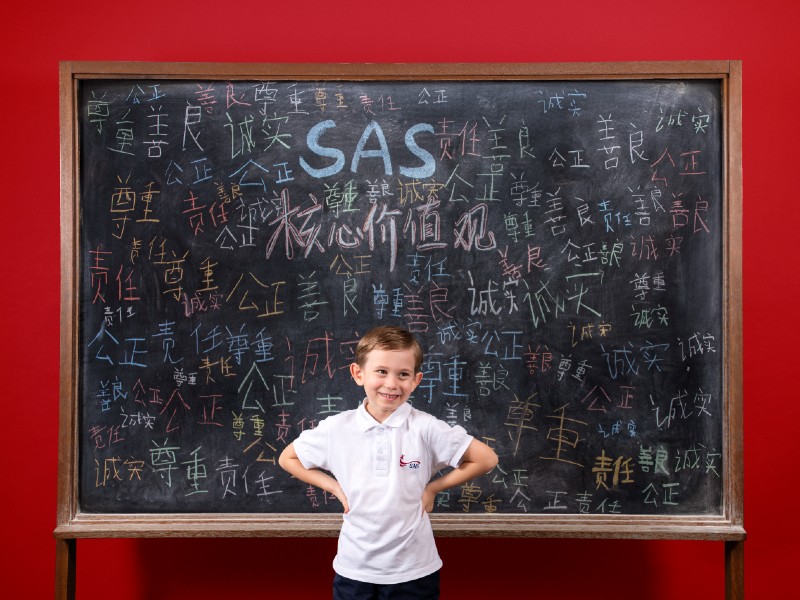Want your child to learn Mandarin in Singapore schools? Many schools have options for students who would like to pick up French, German, Spanish or Chinese as a second or third language. Find out what a student can expect from Mandarin lessons and learning a language at these schools.
Canadian International School
What’s on offer
Every Canadian International School (CIS) student studies an additional language starting from pre-kindergarten (three years). Children from pre-kindergarten to Grade 6 can elect to study an additional language – French or Chinese – in the English programme or to enrol in the bilingual programmes – Chinese-English or French-English – where students are immersed in both languages for equal amounts of time.
In Grades 7 to 10, language choices include Spanish as well as dedicated Chinese and French bilingual pathways for students to continue their bilingual education. Students in the IB Diploma Programme can choose from three language pathways and they can study Language & Literature courses in two languages – English and Chinese or French. They graduate with a bilingual diploma, continue one of the secondary additional languages or study one of over 53 home languages via Pamoja.
CIS also offers an after-school paid language programme to students in Grades 1 to 12. Languages change annually with the demands of the community. Those offered this year include French, German, Japanese, Chinese and Spanish. Children whose first language isn’t English are supported in CIS’ English Language Learner programme and develop their English literacy skills at their own pace.
An inside look
The school’s highly successful bilingual programmes are fully aligned with the IB Primary Years Programme. They include two qualified teachers per class: one native English speaker and one native French or Chinese speaker. Since research shows that speaking a language without understanding its culture has very little real-world value, students also learn about the culture. Over the last six years, CIS students have outperformed all other students in Singapore in the Youth Chinese Test.
Hear from a student
“Learning different units in different languages is really fun – that’s one of my favourite parts of the bilingual programme. I feel confident using two languages now; I feel interested and am comfortable learning maths in two languages.” – Tahira Grade 5
Lakeside Campus, 7 Jurong West Street 41
cis.edu.sg
Dulwich College (Singapore)
What’s on offer
Students at Dulwich College Kindergarten School (DUCKS) (Nursery to Year 2) and Dulwich College (Singapore) Junior School (Years 3 to 6) are immersed in a dual-language environment where “purposeful play is combined with a focus on learning to read and beginning to write in both English and Mandarin”. Lessons for children aged three to seven are taught by a native English-speaking lead teacher with a Mandarin-speaking assistant teacher.
All students study Mandarin and a European language – Spanish, French or German – until the end of Year 8. Then they go on to study the languages of their choice at IGCSE and IB. Year 7 to 13 students have a First Language French and First Language Japanese programme as part of the curriculum. The school also supports students to achieve the Bilingual IB Diploma, which includes First Language Korean, Spanish, French and Japanese for this year. All First Languages can be studied in the IB Diploma at Dulwich and the school welcomes students from all language backgrounds.
An inside look
There are three Mandarin pathway programmes to ensure that adequate support is given to each student, enabling them to highly benefit and enjoy their language lessons. From Junior School onwards, there are additional CCA opportunities in languages. As students progress into Senior School and IB years, they continue to be immersed in the culture and languages they’re studying through a rich and varied curriculum. This includes cultural celebrations and trips that help them in respecting and appreciating their own and other languages, heritages and cultures.
Hear from the school
“Our dual language approach in DUCKS gives our youngest students an opportunity to become comfortable speaking two languages at an early age. Within the framework of the English National Curriculum, linguistic development in both languages will receive equal attention and be tailored to meet each child’s individual needs.”
1 Bukit Batok West Avenue 8
6890 1003 | singapore.dulwich.org
Singapore American School
What’s on offer
Singapore American School (SAS) students are able to study languages including Chinese, Spanish and French as part of its school language programme. Chinese and Spanish are available from the early years while French is offered from sixth grade. Students have language opportunities integrated into every moment, allowing them to gain high-level mastery of the language and become engaged global citizens.
The school also has a Chinese Immersion programme. It operates using a sliding scale model, starting with full immersion in pre-kindergarten with an 80-20 instruction model to a 75-25 instruction model in kindergarten and first grade. 75 to 80 percent of a student’s day is delivered in Chinese through core classes, while lessons in English, music, art, and PE constitute 20 to 25 percent of English instruction. A number of parents who have taken their families to China have great tales to tell of their five- and six-year-olds helping with bookings, ordering meals and more.
An inside look
The immersion classes participate in the same annual excursions as the other grade level classes; kindergarten classes visit a nearby nursing home as part of their service learning. All classes will visit Chinatown just before Chinese New Year, as part of Social Studies and learning about important festivals. Opportunities abound in after school activities including calligraphy, paper cutting, wushu, martial arts classes and even Junior Journalists where students produce their own trilingual magazine in English, Chinese and Spanish.
Hear from a parent
“We didn’t set out to look for a Chinese immersion programme for our younger kids but after seeing it in action, we were very impressed. It’s amazing to see our First Grader read chapter books in Mandarin and write her own realistic fiction series using Chinese characters.” – Aisha Oravec
40 Woodlands Street 41
6363 3403 | sas.edu.sg
Stamford American International School
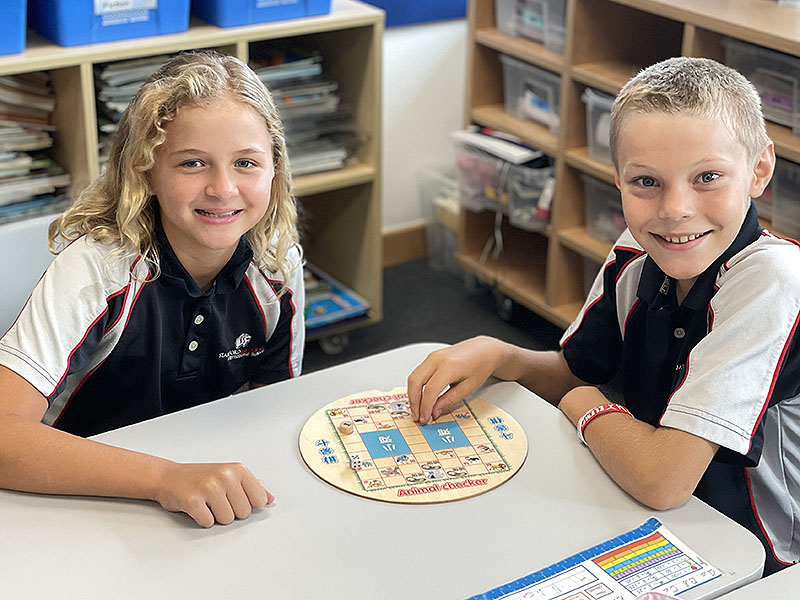
What’s on offer
Stamford American International School offers daily instruction in Mandarin, Spanish and English through their World Language Program. Starting from August 2023, Japanese and Korean will be offered as foreign languages, and Japanese and Korean native speakers in Grades 6 to 10 will also have the option of taking Japanese and Korean Language and Literature respectively. The school also offers English Language Learning Pathways and English as an Additional Language programmes to Stamford American students. Pathways include the innovative Preparatory Course for Secondary School programme as well as the Foundational Academic English Program.
The school’s language programmes follow the guidelines of the American Council of Teaching Foreign Languages and, depending on the grade levels, are delivered using the IB Primary Years, Middle Years and Diploma Program frameworks. Together with the community-based Home Language Program, Stamford American’s language curriculum offers literacy in more than a dozen languages.
An inside look
Classes are inquiry-based with a holistic approach, which values each individual learner and their needs and interests. For example, the programme’s unique one-bilingual-teacher approach is facilitated by bilingual teachers and teaching assistants who are fluent in both languages and demonstrate bilingualism. Students use Mandarin during morning circle, transitions and meal times, learn numbers and maths concepts in both English and Mandarin lessons, and focus on problem solving and reasoning. Through cultural immersion, the community celebrates and appreciates Chinese culture with reading stories, songs and dance, and arts and crafts activities.
Hear from a parent
“We realised quickly that we made the right decision – Eva, our five-year-old, is very fond of the bilingual programme and loves to teach us the new Mandarin words and songs she learns at school.” – Mrs Jamie Toole
1 Woodleigh Lane
6653 2949 | sais.edu.sg
Tanglin Trust School

What’s on offer
All students at Tanglin learn at least one language in addition to English. In the Infant and Junior schools, students learn Mandarin, while in the Senior School, they can learn French, Spanish, Mandarin as well as Latin. All are popular and many students choose to pursue them all the way to IB DP and A Level. In Middle and Upper Schools, the emphasis is put on acquiring language and enabling students to use it. In the Sixth Form, language becomes the vehicle for further study beyond the language as students study literature, arts, politics, history and more. Tanglin students can also study French, Spanish and Mandarin at mother tongue or second language level during language lesson time. Other languages – for example Japanese, Dutch, Hindi, Urdu – can also be studied outside of curriculum time.
An inside look
Cultural appreciation appears earlier than Post-16 in the form of trips abroad as well as Beyond Language projects and cross-curricular activities and events that bring the language to life. For example, French students did a 10-day homestay trip in NIce, France this year and next year there will be trips to Beijing, Alicante and New Caledonia. Some successful events that took place this year are the French debate competition, a Chinese Speaking competition and a Classical Symposium. During Languages Week last year, students had the opportunity to experience Chinese dance, Chinese calligraphy, a cheese tasting workshop, Flamenco classes as well as beginners’ lessons in Spanish, Catalan, Urdu and Portuguese.
Hear from a student
“I study mother tongue Chinese, French and Latin. Whether it’s improving my written Chinese, learning French or understanding the roots of English and other European languages through the study of Latin, I really enjoy all my language classes. I love being able to speak to different classmates in Chinese and French as well as reading and listening activities in class because of the feeling of achievement I get from understanding something I couldn’t before.” – Xiao, Year 7
95 Portsdown Road
6778 0771 | tts.edu.sg
International French School (Singapore)

What’s on offer
The International French School (Singapore) (IFS) offers various language streams starting from early education. These include English+ and International streams with a focus on English, to a European stream with extra classes in Spanish and German, including Latin, or a Mandarin stream. These streams cater to students’ proficiency levels and interests and can be changed based on their educational development and focus.
IFS offers Français Langue de Scolarisation (French Language Schooling) from Grande Section (KG2) to CM2 (Grade 5) to gradually integrate students into the French curriculum. English as a Foreign Language is available from CP (Grade 1) to CM2. For non-French speakers, the school’s French Passerelle is an immersive French language support programme for 6ème and 5ème (Grade 6 and 7). It’s designed to gradually integrate them into the French curriculum. The school’s curriculum is rooted in the French national curriculum and places a significant emphasis on language acquisition so that IES graduates are equipped with a competitive edge in life. Students can obtain certifications validated by internationally recognised organisations such as Cervantes Institute for Spanish, Goethe Institute for German, and YCT and HSK for Mandarin.
An inside look
One of the opportunities IFS students in the French schooling system has is the ADN-AEFE Exchange Programme. It facilitates students in Seconde (Grade 10) to learn in another school in another country within the AEFE (Agency for French Education Abroad) network. For several weeks, students are immersed in a new family environment, school, cultural and linguistic space. This enables them to enrich their learning. It’s named in honour of the pioneering female explorer, Alexandra David-Néel (1868–1969) who was a writer, lecturer, Sanskrit grammarian and explorer among other things; her life and personality embodies the spirit of the programme.
Hear from a student
“I had the chance to participate in the ADN-AEFE exchange programme and did my exchange in Sitges, a lovely little seaside town near Barcelona, Spain. The host family welcomed me warmly and showed me around the entire city. I got to see the cultural differences both in daily life and in school practices and practise my Spanish. This experience has greatly increased my independence, allowed me to learn a language and discover a new culture as well.” – Océane, Grade 10
3000 Ang Mo Kio Avenue 3
6805 0000 | ifs.edu.sg
Chatsworth International School
What’s on offer
Chatsworth encourages students to develop an appreciation of literature in its many forms through language and learning about language. Kindergarten 1 and 2 students of Chatsworth International School are introduced to the fundamental skills essential for Mandarin. From Years 1 to 6, students choose to study either Mandarin or French. At secondary school, Chatsworth offers a Mother Tongue Language Programme that currently supports about 20 languages and as well as any language in the DP school-supported self-taught language.
Framed by the MYP and DP principles and requirements, the school’s mother tongue programme is aligned with progressive objectives, skills and understandings to address students’ language and cognitive development. It’s an inquiry-based, project-based and concept-driven programme. This allows students and external mother tongue tutors to decide on the content of the units while following the required skills and understandings.
An inside look
Language ‘LAh’ recently returned after a gap year. It has been an annual event celebrating Language Acquisition at the secondary school. Students of various year levels impressed the audience by reciting poems, singing songs and telling stories in languages such as French, Mandarin and Spanish.
Hear from a parent
“The school offers Mandarin and French language choices, and students choose a stream from Year 1 onwards. This means they have multiple lessons per week in their chosen language, which helps them learn quickly. Our daughter’s favourite class is Mandarin lessons!” – Abigail Browne
72 Bukit Tinggi Road
6463 3201 | chatsworth.com.sg
EtonHouse International School

What’s on offer
EtonHouse has been a pioneer in bilingual education since its inception in 1995. The school offers different tracks in English-Mandarin bilingual education from preschool to high school to suit different learning styles and goals. Those who want to develop a stronger language proficiency can opt for the EtonHouse ZhongHua Full Mandarin Immersion Programme in the early years and, in Primary, choose the award-winning Bilingual Immersion Programme.
The school was highly commended by WhichSchoolAdvisor (Singapore) with the Best Bilingual Programme Award. It was also awarded Best Language Programme (Silver) at HoneyKids Singapore Education Award 2022. With a strong foundation, students can then continue to pursue Mandarin as a subject in the IGCSE and International A-Levels. Selected EtonHouse campuses also offer Japanese, Hindi, Spanish, and a successful English as an Additional Language programme.
An inside look
EtonHouse believes language is not ‘taught’ but naturally acquired through meaningful experiences based on children’s interests and an inquiry-based approach. It adopts a transdisciplinary approach to learning a language – students are encouraged to use the language in context across different subjects. The school’s curriculum scaffolds the strands of listening, speaking, reading and writing to ensure a systematic approach to language acquisition. The teachers also differentiate the learnings so that each child builds on their competencies in the language from simple to complex.
Cultures, lifestyles and history are integrated into the curriculum to nurture a deeper appreciation and love for the language. Experiences such as art, music, poetry, calligraphy and opera are incorporated to make learning fun. The children also have the opportunity for cultural appreciation through the celebration of traditional festivals by putting up cultural performances. They also explore the language and its cultural context through field trips where they are presented with opportunities to speak the language.
Hear from a student
“I’ve been learning Mandarin at EtonHouse Broadrick for five years. What I like most about the Bilingual Immersion Programme is learning new words. I have progressed from easy Mandarin characters to being able to write complicated Mandarin words and write a whole Mandarin book. I also love reading Chinese storybooks, especially Chinese idiom stories.” – Henry Griffiths, Year 6 Bilingual Immersion Programme
11 preschools and three international schools islandwide
6746 3333 | etonhouse.edu.sg
Kinderland Singapore
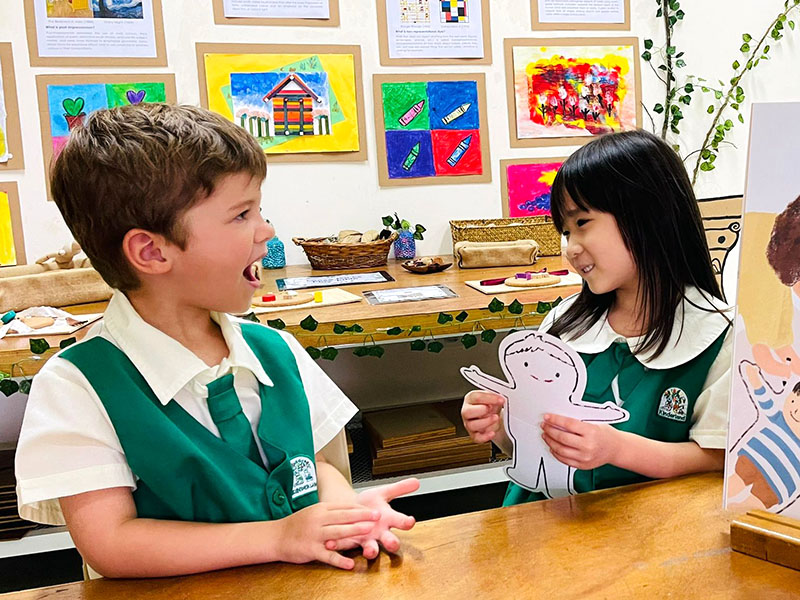
What’s on offer
Established in 1978, Kinderland offers quality infant care and bilingual preschool education to children aged two months to six years. Kinderland emphasises developing proficiency in both English and Chinese languages. Their Chinese Integrated Curriculum benefits from the expertise and resources gathered from Kinderland’s extensive network of over 20 centres in China and the school’s affiliation with Beijing Normal University. This programme is in line with the proficiency benchmarks set by HSK International for the Chinese language, and all Kinderland Chinese teachers are HSK-certified. The school’s pedagogical approach synergises the English and Chinese curriculums. The approach of exploring similar themes in both languages fosters a comprehensive learning experience that embraces a wider cultural and linguistic context.
An inside look
The school’s programme is infused with engaging elements such as theme songs, rhymes and children’s literature. These ensure that the process to learn Mandarin in Singapore is both captivating and enjoyable. Complementing these are hands-on activities that directly align with these themes to provide a more tangible and relatable learning experience.
In August, 2019, Kinderland Preschool @ Marine Parade launched English-Japanese bilingual classes. Tailored specifically for Japanese children aged two to five years, the classes are led by experienced Japanese teachers. The curriculum of these classes includes aspects of Japanese culture, offering holistic linguistic and cultural learning journeys.
Hear from a parent
“We love the multidisciplinary curriculum to learning a language. The kids have access to a computer lab, music programme, extracurriculars and daily Mandarin lessons. The Chinese teachers are incredibly encouraging and supportive of their learning. We’ve also been impressed at how much the boys are learning with their maths and reading skills.” – Heather and Jeff Doherty
Kinderland Academy & Preschool
15 locations island-wide
kinderland.com.sg
ELFA Preschool
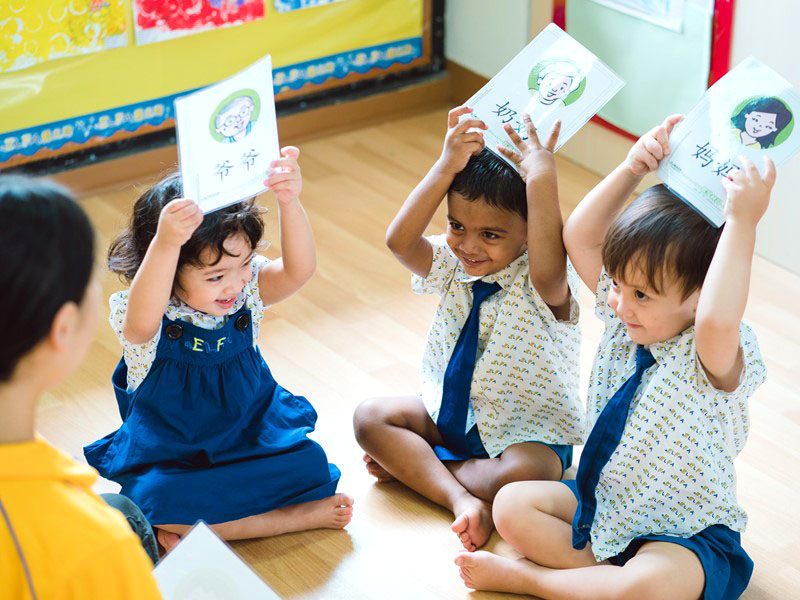
What’s on offer
ELFA Preschool has a well-rounded language programme focusing on English and Mandarin lessons, with a significant emphasis on the latter. The comprehensive educational approach exposes ELFA children to about 800 Chinese characters by the completion of Kindergarten Two. This is made possible through a collaboration with distinguished advisors including esteemed Professor Zhu Shi Yuan, former Head of the Early Childhood Department at Beijing Normal University.
The school’s curriculum is thoughtfully designed around a thematic and story-based approach. It simplifies complex concepts into engaging tales that captivate children’s minds, helping them grasp ideas with ease. Rather than following a traditional approach, ELFA’s language programme focuses on interactive and fun-filled learning experiences. One of these is Chinese Speech and Drama, an initiative that boosts language skills and also self-confidence in the school’s children.
An inside look
ELFA engages its learners in Chinese folklore and stories as well as weekly discussions on moral values. Through these immersive activities, children gain a heightened awareness of righteousness, contributing positively to their character development. The Chinese-inspired Art Programme encourages self-expression, while also instilling an appreciation for traditional art forms, nurturing creativity and cultural awareness, and fostering creativity among their learners.
Instead of solely focusing on the language when students learn Mandarin in Singapore, ELFA aims to foster well-rounded children through their school’s unique High-Order-Thinking-Math programme. This programme brings mathematical concepts to life, promoting advanced cognitive skills through a fun and engaging way
Hear from a parent
“After transferring to ELFA Hougang, my son started to show interest in school as well as Chinese as a second language. ELFA’s curriculum has helped Calen to learn languages in a fun way. With guidance and support given by the teachers, he has improved a lot. He has started to share with us the activities he does in school. Teachers don’t only teach the children but they also treat them like their own. My child always enters ELFA with a smile on his face.” – Sandy
Three locations island-wide
elfapreschools.com/singapore
Swiss School in Singapore
What’s on offer
The school has a German and a French stream. The German stream follows the Lehrplan 21, which harmonises the curriculum and the goals of all German-speaking cantons in Switzerland. The French stream follows the Plan d’Études Romand, which defines the global project of student education adopted by all French-speaking cantons in Switzerland.
Early Childhood children are taught in English with introductions in German or French when learning a language. From Kindergarten onwards, the main language is either German or French, together with English. In Class 5, German stream students learn French and French stream students learn German. Mandarin lessons are offered as an extracurricular activity from Playgroup II/Kindergarten onwards for those who want to learn mandarin in Singapore.
An inside look
Swiss School in Singapore guides children to learn and work independently according to their age. Students in the Early Childhood classes experience a play-based approach with focused topics that combine both child-initiated and teacher-supported learning. There’s a mixture of outdoor, art, music, story time and movement (including sport swimming), and other sensory experiences that encourage interaction between the child and their peers or environment. In Primary level, children experience meaningful learning by actively setting goals, creating their own ideas and working out solutions to achieve their aims and objectives.
The school marks events such as Deepavali, St Nicholas and Chinese New Year, and celebrates Advent before Christmas break and Summer Night before Summer break. P3/4 and P3/5 have an annual class camp either to Indonesia or Malaysia.
Hear from a parent
“What a journey Mia had in less than a year! When she started 1st Grade, she couldn’t read or write a word in German. Thanks to the incredible support and teaching approach to learning a language, she’s now rocking it as a passionate reader and writer. Big thanks to the Swiss School for making this transformation possible.” – Marina Sologubova
38 Swiss Club Road
6468 2117 | swiss-school.edu.sg/en
St. Joseph’s Institution International
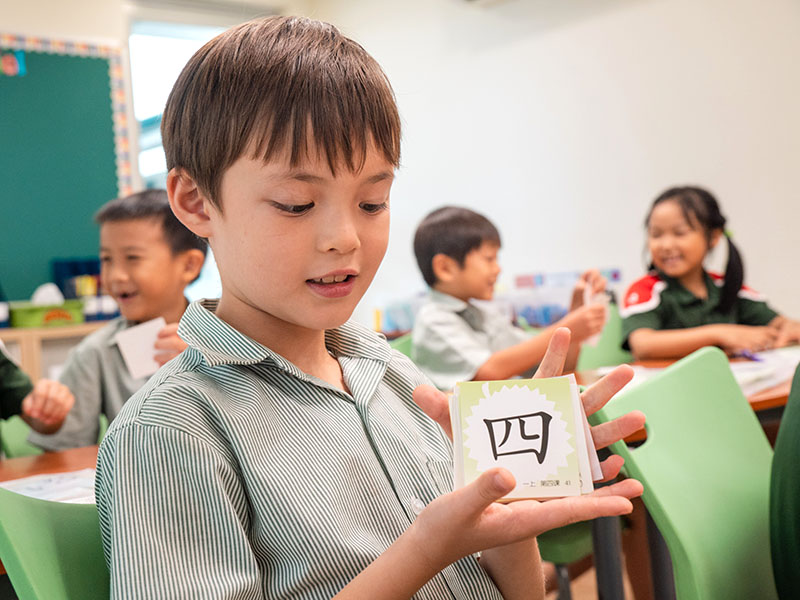
What’s on offer
SJI International offers Mandarin lessons to all grades in Elementary School as a part of the curriculum, along with the additional option of Spanish in Grades 5 and 6 (subject to eligibility). As High School caters to international and Singaporean students, language tuition (including the Mother Tongue programme) is extensive. Eligible students can study Chinese, French, German, Hindi, Indonesian, Japanese, Korean, Malay, Spanish, Tamil and Vietnamese as well as an English Acquisition programme. Chinese is developed through not only language tuition but cultural awareness as well.
The school also offers English as an Additional Language and a Language Acquisition Programme for students who require additional support in their comprehension of the English language. The programmes offer specialised and tailored support for students whose English is not their first language ensuring they can access the exemplary academic curriculum.
In January 2024, SJI International Elementary School will launch a Bilingual Programme that’s designed for both native and non-native speakers to become equally proficient in both English and Chinese. The programme will follow a Two-Way Immersion education model, with equal emphasis on both languages. The 10-day teaching cycle includes alternating language instruction, which in turn allows students to develop their intercultural competence, thinking and analytical skills in addition to exposure to global perspectives and ideas.
An inside look
The school’s Language Arts Programme in Elementary School focuses on oral communication, reading and writing for the learning and development of students. In High School, students are frequently encouraged to engage in cultural activities; for Home Language students, this promotes stronger connections to their home country and deepens the understanding of their own culture.
Hear from a parent
“We’re thrilled that our children, Pierard (8) and Agatha (6) are exposed to daily Mandarin language classes. We would highly recommend SJI International for any family who is looking for the quality of international school education for their children, coupled with a value-based community feel.” – Jane and Oliver Somerville
490 Thomson Road
6353 9383 | sji-international.com.sg
Here’s our huge guide to international schools in Singapore and tips on choosing an international school here.







